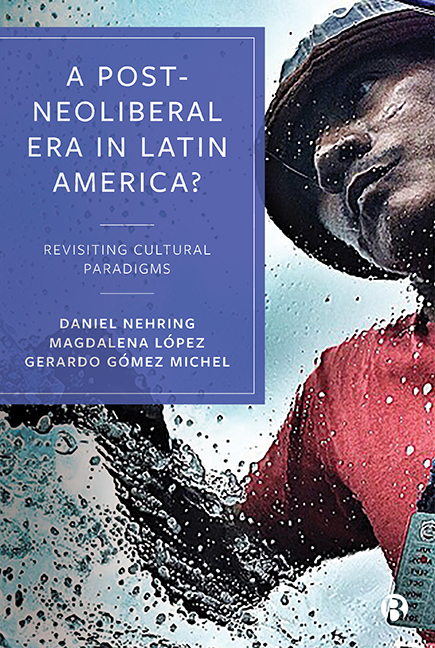Book contents
- Frontmatter
- Contents
- List of Tables and Figures
- Notes on Contributors
- 1 Introduction: Everyday Life in (Post-)Neoliberal Latin America
- 2 Imaginaries, Sociability and Cultural Patterns in the Post-Neoliberal Era: A Glance at the Argentinean, Paraguayan, and Venezuelan Experiences
- 3 Making Neoliberal Selves: Popular Psychology in Contemporary Mexico
- 4 From Uribe’s “Democratic Security” to Santo’s Peace Accords with the FARC: Hate, Fear, Hope and other Emotions in Contemporary Colombian Politics
- 5 Cine Bajo Tierra: Ecuador’s Booming Underground Cinema in the Aftermath of the Neoliberal Era
- 6 Neoliberalising Humanity: Culture and Popular Participation in the Case of the Street Market of Caruaru, Brazil
- 7 The Contribution of the Catholic Magazine Espacio Laical and the Constitution to the Cuban Public Sphere
- 8 Argentina: The Philosophical Resistance to the Conquest of the Soul1
- 9 Fleeing (Post-)Chávez Memories: The 1990s and the Black Friday Generation
- 10 Re-imagined Community: The Mapuche Nation in Neoliberal Chile
- 11 Neoliberalism and the Negotiation of the American Dream in Contemporary Latina Narratives
- 12 Bare Life in Contemporary Mexico: Everyday Violence and Folk Saints
- Index
5 - Cine Bajo Tierra: Ecuador’s Booming Underground Cinema in the Aftermath of the Neoliberal Era
Published online by Cambridge University Press: 20 April 2022
- Frontmatter
- Contents
- List of Tables and Figures
- Notes on Contributors
- 1 Introduction: Everyday Life in (Post-)Neoliberal Latin America
- 2 Imaginaries, Sociability and Cultural Patterns in the Post-Neoliberal Era: A Glance at the Argentinean, Paraguayan, and Venezuelan Experiences
- 3 Making Neoliberal Selves: Popular Psychology in Contemporary Mexico
- 4 From Uribe’s “Democratic Security” to Santo’s Peace Accords with the FARC: Hate, Fear, Hope and other Emotions in Contemporary Colombian Politics
- 5 Cine Bajo Tierra: Ecuador’s Booming Underground Cinema in the Aftermath of the Neoliberal Era
- 6 Neoliberalising Humanity: Culture and Popular Participation in the Case of the Street Market of Caruaru, Brazil
- 7 The Contribution of the Catholic Magazine Espacio Laical and the Constitution to the Cuban Public Sphere
- 8 Argentina: The Philosophical Resistance to the Conquest of the Soul1
- 9 Fleeing (Post-)Chávez Memories: The 1990s and the Black Friday Generation
- 10 Re-imagined Community: The Mapuche Nation in Neoliberal Chile
- 11 Neoliberalism and the Negotiation of the American Dream in Contemporary Latina Narratives
- 12 Bare Life in Contemporary Mexico: Everyday Violence and Folk Saints
- Index
Summary
I film, therefore I am.
Nelson Palacios, Ecuadorian filmmaker
When I am not around anymore, I want to be remembered as a woman who was important. I want to make something real, so when people ask “Who was Irma Herrera?” they will remember me … as the pioneer of cinema in [my hometown of] El Triunfo.
Irma Herrera, Ecuadorian filmmaker
Film or die!
Fernando Cedeño, Ecuadorian filmmaker
There is a cinematic boom going on in Ecuador. Long gone are the days when Ecuadorian films were few and far between, when there could be prolonged periods of time—sometimes several years in a row—without a single movie release, when every new motion picture felt like the first. In fact, when La tigra (The tigress), a film based on a short story by José de la Cuadra and directed by Camilo Luzuriaga, premiered in 1990, renowned Ecuadorian poet and cineaste Ulises Estrella sardonically criticized its promoters’ apparent inaugural pretensions (De la Vega, 2016, pp. 20–21). La tigra was not the first feature-length fictional film ever made in the South American country, of course, but it quickly became—and, today, it still is—the biggest box office hit in the history of Ecuadorian cinema.
La tigra's success notwithstanding, the 1990s saw the release of only three additional Ecuadorian movies, one of them also directed by Luzuriaga, and the other two by various members of just one single family. Sensaciones (Sensations), by siblings Juan Esteban Cordero and Viviana Cordero, premiered in 1991; Entre Marx y una mujer desnuda (Between Marx and a naked woman), by Luzuriaga, in 1996; and Ratas, ratones, rateros (Rats, mice, petty thieves), by Juan Esteban and Viviana's younger brother, Sebastián Cordero, in 1999. The latter film, arguably the first one made in the South American nation with international production values, marks a definite watershed in the history of Ecuadorian cinema, to such an extent that it is usually heralded as the cornerstone of today's so-called boom.
- Type
- Chapter
- Information
- A Post-Neoliberal Era in Latin America?Revisiting Cultural Paradigms, pp. 93 - 114Publisher: Bristol University PressPrint publication year: 2019



